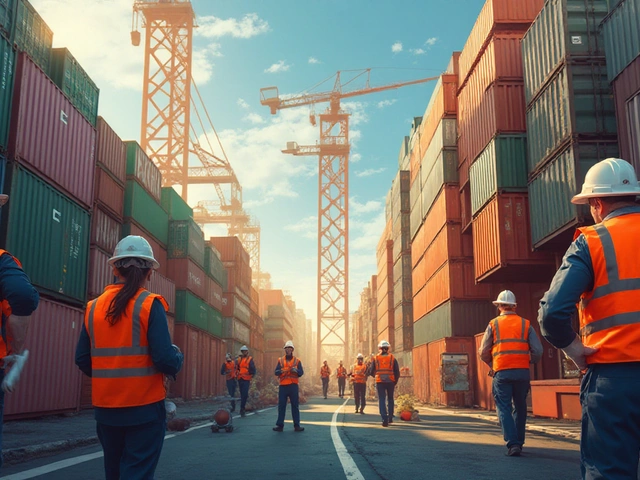The world of logistics spins on the axis of a logistician's savvy ability to solve complex problems, keep the supply chain flowing, and adapt to sudden changes. This role is paramount in today's fast-paced, global market.
But is it as overwhelming as it sounds? Many aspiring logisticians wonder about the stress levels tied to this career. Understanding the nature of the work is the first step in addressing these concerns. From high-stakes problem-solving to constant changes in demand, logisticians must navigate an ever-dynamic field.
In this article, we're peeling back the layers of what it means to be a logistician. What's the real picture behind the stress? And if it exists, how can one manage it effectively? Join us as we delve into the heart of the logistics industry, unraveling both challenges and the gratifying rewards that come with it.
- Understanding the Logistical Landscape
- Challenges Faced by Logisticians
- Rewards of a Career in Logistics
- Managing Stress in Logistics
Understanding the Logistical Landscape
When diving into the bustling world of logistics, it’s essential to grasp the intricate web that logisticians navigate daily. The logistical landscape is the backbone of global trade, ensuring goods flow seamlessly from origin to destination. Operating in this environment means managing everything from warehouse storage capacities to the intricacies of last-mile delivery. Each step of the supply chain must synchronize like a well-oiled machine. Traditional logistics has evolved from manual, paper-based systems to sophisticated, technology-driven solutions. Today, a logistician's pivotal role involves leveraging IT systems that offer real-time tracking, predictive analytics, and automated inventory management. Such tools empower logisticians to make data-driven decisions, anticipating potential disruptions before they arise.
Key aspects that define the logistical landscape include understanding the balance of supply and demand, strategizing the most efficient route planning, and maintaining strong relationships with both suppliers and customers. In this realm, a logistician's job is analytical yet dynamic, requiring both a sharp mind and an adaptable outlook. They often collaborate across departments, liaising with marketing, sales, and finance teams to ensure alignment with the company's broader objectives. Through this collaboration, logisticians help the company remain competitive in rapidly changing markets. Moreover, globalization means logisticians must also be attuned to international transport regulations, tariffs, and cross-border challenges. It's a profession where staying informed is not just beneficial—it's crucial.
“The logistics profession is an unsung hero of the business world,” remarked KPMG’s head of supply chain advisory, highlighting the complexity and importance of the field.
To truly appreciate the scope of logistics, one must acknowledge the advances in technology that have transformed the industry. The rise of automation and AI presents new opportunities and challenges alike. Automated processes improve efficiency, yet they require logisticians to constantly update their skills and adapt to novel tools and practices. Meanwhile, Big Data aids in refining logistics strategies, providing insights into consumer behavior patterns and potential market changes. For instance, predictive analytics can forewarn of shifts in consumer demand, enabling companies to adjust their inventory levels accordingly. A logistician’s role is not simply about overseeing transportation. It's about shaping the very strategies that ensure product availability aligns with market needs.
In understanding this landscape, it is vital to recognize the delicate balance logisticians maintain between cost efficiency and service quality. Budget constraints and operational expenses often require logisticians to innovate, finding cost-effective solutions without compromising on delivery speed or safety. This balance becomes particularly noticeable in e-commerce, where customer expectations for speedy delivery have soared, pushing logisticians to find innovative solutions while keeping costs in check. The logistical landscape is thus a world of intense challenges but equal rewards, reflecting the necessity of the logistician’s expertise in today’s interconnected economy.

Challenges Faced by Logisticians
Being a logistician can often feel like a high-wire act, balancing a number of moving parts with precision and efficiency. The intricate dance of managing supply chains means that logisticians must be prepared for issues that can arise at a moment’s notice. One major challenge is dealing with the ever-present ticking clock. Logistics operates in real-time, and delays can cascade through the system like dominoes, affecting not only initial deliveries but also the entire network of pending transactions. Keeping products moving steadily and on time in the face of unpredictable events requires a keen eye for detail and exceptional organizational skills.
Another significant challenge is adapting to rapidly evolving technology. Technological advancements are both a boon and a bane; they streamline operations but also require constant learning and adaptation. Logisticians need to be technologically savvy, capable of integrating new software solutions that enhance efficiency and tracking while minimizing errors. A study by Deloitte found that 63% of logistics companies planned to invest significantly in technology, underscoring its growing significance in staying competitive.
Furthermore, the pressure of cost management cannot be overstated. In the logistics industry, margins are often thin, and logisticians must constantly find innovative ways to minimize costs without sacrificing service quality. This involves negotiating with suppliers, optimizing routes to save fuel, and employing creative problem-solving techniques to manage unexpected expenses. It's a strategic puzzle that demands not only analytical skills but also the ability to work collaboratively with various stakeholders.
Dealing with regulatory complexities is another hurdle logisticians face. Different countries, and even regions within countries, have their own regulations that influence how goods must be transported and handled. Staying compliant with these diverse rules requires not only a strong grasp of international law but also an ability to foresee the implications of regulatory changes. Such changes can occur with little warning, adding to the looming specter of unpredictability in this profession.
Occasionally, supply chain interruptions stem from unforeseen global events such as natural disasters, geopolitical tensions, or pandemics. These factors necessitate a logistician's ability to improvise quickly. In these instances, logisticians find themselves in the role of both detective and firefighter, tasked with identifying alternative routes and solutions while under significant pressure. This was evident during the COVID-19 pandemic when logisticians had to pivot swiftly to address sudden disruptions and shortages.
"Resilience is not about preventing disruptions, but rather about minimizing the impact of these disruptions," says Martin Christopher, a renowned logistics expert. This mindset is crucial for logisticians who need to not just respond, but anticipate, potential hurdles.Logisticians' roles are undeniably challenging but deeply rewarding for those who can master the art of strategic foresight combined with decisive action. Each day presents new puzzles to solve, turning challenges into opportunities for growth and innovation.

Rewards of a Career in Logistics
Diving into the realm of logistics unveils a treasure trove of opportunities that extend beyond the traditional desk job. One of the most alluring aspects of a career in logistics is the impact that logisticians have on global commerce. As a logistician, you become the nerve center of supply chains, ensuring that goods flow smoothly from point A to point B, which is critical for businesses and consumers alike. This influential role provides a sense of purpose and satisfaction that many professionals seek throughout their careers.
Moreover, the logistics industry is known for its stability and growing prospects. With the rise of e-commerce and globalization, there's an ever-increasing demand for skilled logisticians to manage the intricate web of supply chains. This growth translates into ample career opportunities and job security, making logistics an attractive field for many. According to industry data, the logistics sector is predicted to grow significantly in the coming years, both in terms of size and technological advancement, hence offering a steady climb up the career ladder.
Beyond job security, a career in logistics offers diverse specialization areas such as transportation, warehousing, inventory management, and procurement. Each specialization allows professionals to tailor their careers to match personal interests and strengths, providing a level of flexibility that is often hard to find in other industries. Additionally, the global nature of logistics careers often presents opportunities for travel and cross-cultural interactions, which can be incredibly enriching and exciting.
Compensation in the logistics field is competitive, often reflecting the complexity and high responsibility of the work involved. As logisticians advance in their careers and gain expertise, they often see significant financial benefits and bonuses. As the industry becomes more technologically inclined, acquiring skills in logistics software and data analytics can further enhance earning potential, providing a lucrative pathway for tech-savvy professionals.
"The logistics industry is not only the backbone of our economy but also offers rewarding career paths. It's a dynamic field where every day brings new challenges and opportunities," says John Smith, CEO of Global Logistics Co.
The intrinsic rewards of solving problems, optimizing processes, and contributing to the efficiency of supply chains are highly fulfilling for many logisticians. Such achievements often boost personal satisfaction and morale, enhancing the overall work-life experience. Furthermore, the collaborative nature of the logistics industry aids in building robust professional networks, creating opportunities for mentorship and community within the profession.
In summary, a career in logistics is not just about challenges; it has a multitude of rewards that can lead to a fulfilling and prosperous professional life. From the satisfaction of being an integral part of global commerce to the financial and personal rewards it offers, a logistics career promises a rich journey for those who embark on this path. By understanding these rewards, aspiring logisticians can make informed decisions about their futures, ensuring a satisfying and successful career in the logistics industry.

Managing Stress in Logistics
Managing stress in the dynamic world of logistics requires a blend of strategic planning, resourcefulness, and self-care. The role of a logistician might feel like being at the center of a whirlwind, but with the right tools and mindset, managing stress effectively becomes possible. The first step is recognizing the stressors. High volume demands, tight deadlines, and the constant expectation to perform at peak levels are just a few challenges logisticians face daily. Recognizing these as potential stress triggers allows one to develop strategies to mitigate their impact. Equally important is acknowledging that stress itself is not the enemy. It’s an innate response designed to up the ante when challenges arise. The key lies in harnessing this response to fuel productivity rather than hinder it.
Building a robust support network within the workplace can amplify stress management. Fellow logisticians, managers, and team members can offer invaluable insights and shared experiences to navigate through difficult times. Open communication about workload expectations can prevent misunderstandings and ultimately reduce stress levels. Sometimes, taking a step back to prioritize tasks can seem daunting, yet it’s a critical move to ensure the most crucial tasks are handled efficiently. Having a clear, tangible goal for each day can help in halving the work mountain into manageable sprints.
Employing technology effectively also serves as a significant stress alleviator. With advancements in logistics software, many repetitive tasks can be automated, leaving more room for critical thinking and decision-making. Tools that optimize shipping routes, inventory management, and customer interaction play a pivotal role in reducing the daily load. Automation does not only ease the manual workload but also reduces human errors, thereby decreasing potential re-work stress.
"The future belongs to those who prepare for it today," Martin Luther King Jr. once remarked. Though not directly linked to logistics, the essence of preparation resonates strongly with logisticians striving to handle stress.
Self-care practices cannot be overstressed. Regular exercise, sufficient sleep, and mindfulness practices all contribute to a healthier body and mind, better equipped to handle the pressures of a logistics career. Mindful breathing exercises, for example, can be performed in mere minutes and have a profound impact on stress levels. Establishing clear boundaries between work and personal life fosters a healthier relationship with work, ensuring that you can recharge adequately for the tasks ahead.
Sometimes, numbers can paint a supportive picture. A 2023 study indicated that companies that foster a positive work environment and promote well-being among logisticians saw a 20% increase in productivity and a 15% decrease in employee turnover. Creating this balance transforms the workplace into a space of motivation rather than dread. Employers and employees alike benefit from an environment that nurtures mental well-being, proving that stress management is as much a communal effort as it is individual.
Finally, frequent reflection and appraisal of one's own methods provide a feedback loop essential for growth. Identifying what strategies work or need adjustment can significantly influence long-term stress levels. Armed with these approaches, logisticians can not only manage stress but thrive amidst their fast-paced challenges.





